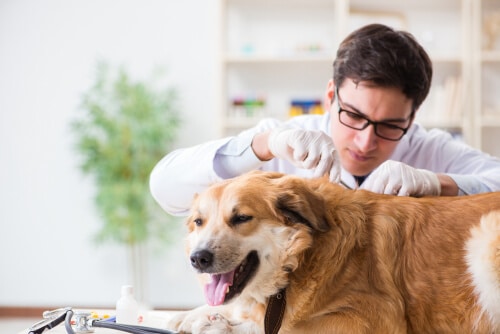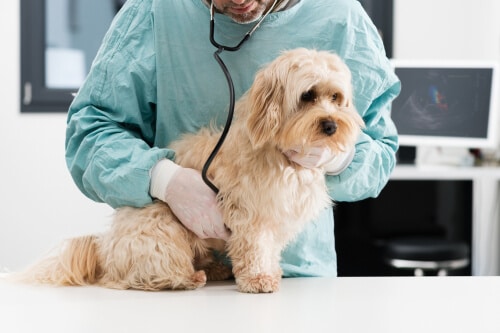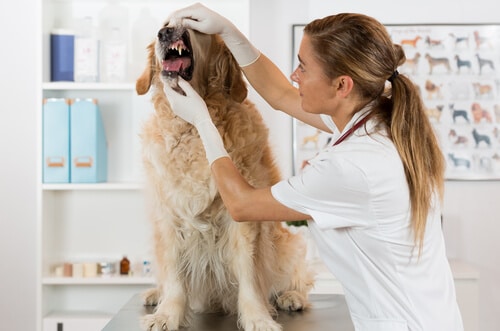Email Address
engage@dogtraininginfo.org



















A healthy dog will have a shiny coat, bright eyes, clean ears, strong muscles, and good dental health. Female dogs will also have a normal heat cycle. Other symptoms of a healthy dog include regular bowel movements, plenty of energy, and a good appetite. internal parasites can be a sign of poor health in dogs, so it’s important to keep an eye out for them. If you think your dog may be sick, it’s always best to consult with your veterinarian.
The most common health problem that affects female dogs is pyometra, which is an infection of the uterus. Other common problems include mammary tumors, ovarian cysts, and endometriosis.
Pyometra typically occurs after a female dog has been in heat, and the most common symptom is vaginal discharge that is pus-like or bloody. Other symptoms include lethargy, fever, anorexia, and vomiting. If left untreated, pyometra can be fatal.
The best way to prevent pyometra is to have your female dog spayed before she comes into heat for the first time. This will remove her ovaries and uterus and therefore eliminate the risk of developing this condition.
Internal parasites are another common health problem in dogs, especially puppies. These are organisms that live inside the dog’s body and can cause a variety of problems, ranging from mild to life-threatening.
The most common symptom of internal parasites is weight loss, but other symptoms include diarrhea, vomiting, anemia, and weakness.
The best way to prevent your dog from getting internal parasites is to have them checked by a veterinarian regularly and to follow their recommendations for prevention and treatment. Some common preventive measures include using monthly heartworm prevention medication and keeping your dog up-to-date on their vaccinations.
The most common health problem for dogs is infectious diseases. Infectious diseases are caused by bacteria, viruses, or parasites. They can be spread through the air, water, food, or contact with contaminated surfaces.
Lyme disease is the most common infectious disease in dogs. It is caused by bacteria that are transmitted by ticks. Symptoms of Lyme disease include fever, lameness, and loss of appetite. Lyme disease can be treated with antibiotics.
Food allergies are another common health problem in dogs. Food allergies are caused by an intolerance to certain proteins in food. Symptoms of food allergies include vomiting, diarrhea, and itching. Food allergies can be treated by avoiding the offending foods and giving the dog a hypoallergenic diet.
The most common infectious diseases in dogs are Lyme disease, distemper, and parvovirus. Lyme disease is caused by bacteria that are transmitted by ticks. Symptoms of Lyme disease include fever, lameness, and loss of appetite. Lyme disease can be treated with antibiotics. Distemper is a viral illness that affects the respiratory and nervous systems. Symptoms of distemper include fever, coughing, and runny nose. Distemper can be prevented with vaccinations. Parvovirus is a viral illness that affects the gastrointestinal system. Symptoms of parvovirus include vomiting, diarrhea, and lethargy. Parvovirus can be prevented with vaccinations.
The symptoms of dog illness can vary depending on the condition. However, there are some common symptoms that you should be aware of. These include:
– lethargy
– weight loss
– appetite change
– vomiting
– diarrhea
– constipation
– increased urination or thirst
– excessive panting or difficulty breathing
If your dog is exhibiting any of these symptoms, it is important to take them to see a veterinarian as soon as possible. Early diagnosis and treatment are crucial for many conditions. infectious diseases, Lyme disease, and food allergies are all illnesses that dogs can suffer from. If you think your dog may be ill, don’t hesitate to contact your vet. They will be able to give you the best course of action to take. Thanks for reading! I hope this article was informative and helped you learn more about dog health.
There are a number of things you can do to improve your dog’s health. First, make sure that you are feeding them a high-quality diet. This means choosing food that is rich in nutrients and low in fillers. You should also avoid giving your dog table scraps, as this can lead to obesity and other health problems.
Second, make sure that your dog gets plenty of exercise. Exercise is important for all dogs, but it is especially important for those who are prone to obesity or joint problems. A good way to ensure that your dog gets enough exercise is to take them on walks or runs several times per week.
Third, keep an eye on your dog’s weight. Obesity is a major problem in dogs and can lead to a number of health problems, including joint problems, diabetes, and heart disease. If you think your dog is overweight, talk to your veterinarian about a weight-loss plan.
Fourth, make sure that your dog is up-to-date on all of their vaccinations. Vaccinations are important for preventing diseases and keeping your dog healthy.
Finally, take your dog to the vet regularly. Regular check-ups are important for detecting health problems early and for keeping your dog in good overall health.
By following these tips, you can help keep your dog healthy and happy!
There are a number of things you can do to keep your dog healthy. First, make sure they get plenty of exercises. A healthy dog is a happy dog, and a happy dog is less likely to become sick. Secondly, feed them a healthy diet. Just like humans, dogs need the right mix of nutrients to stay healthy. thirdly, take them to the vet regularly for check-ups and vaccinations. By doing these things, you can help your dog live a long and healthy life.